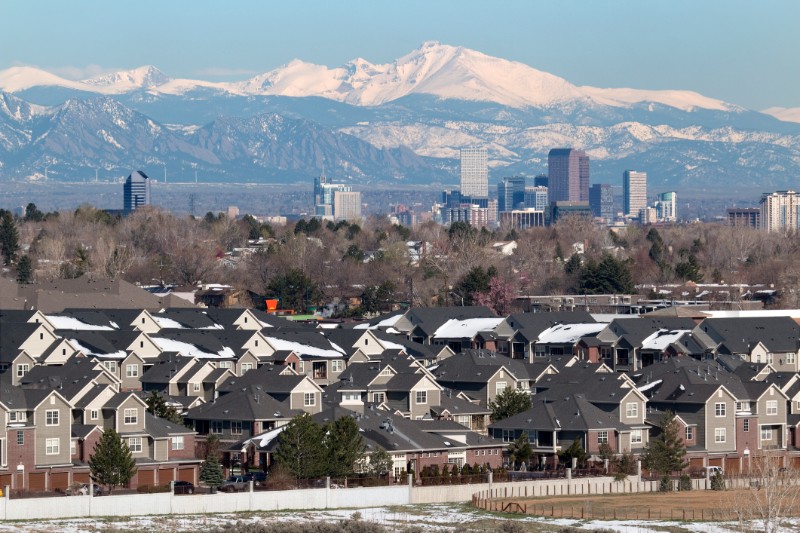Real Estate Investment Guide
Nestled at the gates of the majestic Rocky Mountains, everyone knows you go to Denver to access some of the best ski resorts in the country. But over the years, interest in the Mile High City has expanded to include a wide variety of residential real estate investment properties. And as Denver’s economy continues to grow, savvy investors are finding new opportunities to cash in.
Investing in Denver real estate might just be the next step for you. Continue reading to learn more about the local real estate market, as well as different investment strategies and common pitfalls to avoid as you expand your property portfolio in Colorado’s capital city.
DENVER 101
Denver is the sprawling capital of Colorado, spread over nearly 155 square miles in the Front Range Urban Corridor, a region that’s tucked between the High Plains and the Rocky Mountains. Based on the most recent census, this city– which is also a county– is home to over 715,500 residents. Its elevation, which is precisely one mile above sea level, has earned it the moniker “Mile High City,” adding a unique characteristic to its appeal.
The city was founded in 1858 as a mining town during the Pike’s Peak Gold Rush. It evolved from a frontier outpost to a major trade and cultural hub. It saw many milestones over the years, including the transcontinental railroad’s construction and its emergence as the state’s capital in 1867, reflecting its pivotal role in the expansion of the American West. The city continued to grow and evolve into the bustling mountain metropolis it is today.
Denver is considered a global center and ranks as one of the largest metro economies in the country. Corporate headquarters, small and medium enterprises, as well as a good number of federal agencies have established bases here.
DENVER REAL ESTATE MARKET OVERVIEW
The market in general
- Denver’s real estate market has over 313,000 housing units across the city. Single-family homes and apartments are the two most dominant property types, occupying 43.1% and 42.4% of the market, respectively.
- More than half (51%) of Denver’s existing housing supply is occupied by tenants. A slightly smaller portion of the inventory (48.6%) are owner-owned and occupied. The rest (6.3%) is vacant.
- The median home value in Denver is approximately $597,000 while renters pay an average of $2,649 per month.
- When it comes to age, different eras are well-represented in Denver’s housing market. Nearly half of the housing inventory dates back from pre-1930s to the 1960s, while 27% of the market is composed of homes built between the 1970s and 1990s. If you are specifically interested in investing in more recent Denver real estate builds, you’ll also have a good selection; approximately 24.2% of the local housing market consists of homes built in the 2000s.
Current key trends to take note of
While Denver’s housing market is relatively strong and healthy, it isn’t immune to larger trends that are affecting the country at large. Consider the following conditions as you formulate your plans of investing in Denver real estate:
- Home prices have slightly increased: Denver real estate ended the year 2023 with a median listing price of $580,000, which shows a 1.8% year-on-year increase. That said, homes were sold about 0.96% below their original asking prices.
- Extended days on the market: It’s still possible to close a sale fast, but on average, homes for sale in Denver take about 71 days to sell. Being pre-approved for a mortgage and making certain concessions are some of the things you can do to speed up your purchase.
- Downward trends in several areas: Based on January 2024 numbers, the Denver metro area saw noteworthy month-over-month decreases in several aspects:
- There were only 4,971 active listings, which shows a 25.63% decrease
- New listings and pending sales declined by 36.49% and 5.29%, respectively
- The median close price for this period was $551,993, reflecting a 2.80% decline
- Closed homes (2,620 sales) and sales volume ($1.72 billion) also dipped
**These figures cover attached and detached residential properties
- Denver’s multifamily sector is hot and promising: As of the third quarter of 2023, the Denver metro area had a total of 35,000 housing units under construction. That same period saw nearly 3,000 additional units delivered, bringing the 2023 grand total to 8,873 units delivered. Because of these additions, it’s easy to see why occupancy rates rose by 20 points.
- Interest rates will continue to affect Denver’s real estate market: But hopes are high that interest rates will finally lower and stabilize this year. If that happens, it’s highly likely for prices to rise and the average days on the market to lower.
Both buyers and investors interested in investing in Denver real estate should adapt and make the most of present market conditions to find the right addition to their real estate investment portfolio.

Six neighborhoods to consider for your investment
Whether you intend to build equity or plan on managing a string of rental properties across Denver, location in real estate investing always matters. The following neighborhoods might suit your plans:
- Lower Downtown (LoDo) — One of the oldest settlements in Denver, LoDo is now an urban neighborhood consisting of trendy art spaces, exciting restaurants and businesses, as well as a thriving rental market that’s highly sought-after among Denver’s creatives and young professionals.
- Highland — Located across the river from downtown Denver, Highland is one of the city’s most established neighborhoods, with fans among the older and newer generations. Its elevated perch, storied history, and diverse real estate offerings make it a highly sought-after neighborhood, so much so that home prices here increase every year.
- Capitol Hill — Capitol Hill is a central neighborhood in Denver characterized by stately mansions, historic architecture, and a lively cultural scene. This community has a diverse demographic of young professionals and artists. Its proximity to an array of amenities makes this neighborhood a strong contender for investment.
- Central Park — Formerly Denver’s airport, Stapleton, now called Central Park, is a master-planned community with a mix of residential, commercial, and recreational spaces. The neighborhood is firmly committed to sustainability and green living and appeals to anyone seeking a suburban feel with access to urban amenities.
- Cherry Creek — Cherry Creek is Denver’s shopping central and also one of the best neighborhoods to invest in. Over the years, this area has seen tremendous growth in real estate values, with home prices jumping by 28 points year-on-year back in 2023. Investing in Cherry Creek real estate can be pricey, but can be rewarding thanks to the neighborhood’s great schools, amenities, and outstanding quality of life.
- Five Points — Recognized for cultural diversity and historic significance, Five Points is undergoing a renaissance. The revitalization of the area includes new residential developments, unique dining options, and an emphasis on preserving its cultural heritage.
This is just the tip of the iceberg– Denver has over 70 official neighborhoods! It’s recommended to work with a local real estate expert so you can zoom in on areas aligned with your goals in investing in Denver real estate.
EXPLORING YOUR RESIDENTIAL INVESTMENT OPTIONS IN DENVER
Now that you’ve been introduced to Denver’s real estate market and some of its best neighborhoods, take the time to review the housing options available in the city.
Property types
As previously mentioned, Denver’s housing market is a cornucopia of different property types, with single-family homes and apartments right at the forefront.
- Single-family homes — Detached, standalone houses with private yards are the most dominant property type in Denver. These are widely available in many parts of the city, as well as all throughout the Denver metro area. Since most single-family homes already include the actual lots they’re built on, this property type offers the most stability and potential for appreciation.
- Condominiums and townhomes — Condominiums in multi-unit complexes and attached homes with shared walls or townhomes are available. These are ideal for low-maintenance living, tourism, or as an entry point to Denver’s real estate market. Ideally, these are located close to amenities such as public transit.
- Multi-family properties — There are buildings with multiple units, such as duplexes, triplexes, or apartment complexes. This type of property provides an opportunity for rental income from multiple units and is perfect for investors looking to diversify their portfolios and generate cash flow.
- Historic and luxury homes — Historic and luxury real estate in Denver are on a league of their own; they either come with historical significance, unique architectural features, or high-end amenities. While considered by some as niche market sectors, they do have their audience, which can include tenants looking for updated historic homes or high-net-worth individuals staying in Denver for a considerable period of time.
- Fixer-uppers and flips — These are properties in need of renovation or repair. Because of their less-than-desirable state, these homes are cheaper than most other properties. If you have a talent for renovating and flipping, you can add value to these residences and sell them for a higher price. Many Denver neighborhoods offer opportunities for successful flipping projects.
Rental types
Most property types can be turned into rentals, but arrangements can differ depending on your investment goals as well as your intended market. Your main options include:
- Short-term rentals – Denver has a thriving short-term rental market that is continuing to grow, fueled by the city’s appeal to tourists and business travelers. Popular sites like Airbnb and Vrbo help facilitate the rise of short-term rentals offering several property types, from lofts to suburban homes.Investment Appeal
- Tourism: Denver’s cultural attractions and outdoor activities make it a sought-after destination for short-term stays.
- Higher income potential: The demand for short-term rentals during peak tourist season can lead to higher nightly rates and income potential for property owners.
- Long-term rentals – Long-term rentals in Denver can provide a stable source of income, attracting both professionals and young families. The city’s growing population and robust job market contribute to the sustained demand for long-term rental properties.Investment Appeal
- Stability: Long-term rentals offer stability with consistent rental income and reduced turnover.
- Tenant pool: Denver’s diverse population of students, professionals, and families ensures a broad tenant pool.
- Vacation rentals – Denver’s status as an urban hub and gateway to outdoor activities like skiing and hiking makes it perfect for vacation rentals. Visitors come to the city in droves for ski resorts, sporting events, and cultural attractions.Investment Appeal
- Year-round demand: Denver’s appeal spans all seasons, although arguably, ski season is the most popular. With tourists coming in year-round, there will always be a demand.
- Strategic pricing: Understanding peak tourism seasons allows property owners to price vacation rentals strategically based on demand.

FINANCING YOUR INVESTMENT
When it comes to investing in Denver real estate, there are several financing options you can consider based on your financial capacity and other personal and business parameters. These options include:
- Mortgage loans — Investors have various mortgage options when financing real estate investments, each with its own terms and conditions. Some of these include conventional mortgages, Federal Housing Authority (FHA) loans, portfolio loans, and adjustable-rate mortgages.
- Hard money lending — This means obtaining financing from private investors or companies, usually at higher interest rates. These are popular for fix-and-flip projects where quick access to capital is crucial.
- Creative financing — Non-traditional financing methods are also available for real estate investments. These include seller financing, subject-to-financing, and lease options for flexibility in securing funding.
Choosing which financing method to pursue depends on investment goals and risk tolerance, ensuring a well-informed approach to property acquisition.
POTENTIAL PITFALLS AND RISKS TO CONSIDER
Investing in Denver real estate isn’t complete without its own set of risks. Consider the following factors as you search for the right property and create your investment plan:
Market and economic conditions
Don’t forget that the real estate market in general is susceptible to the effects of market and economic conditions.
What goes in the economy– such as employment and inflation rates– can impact property values, rental demand, and prices, to name a few things. For instance, downturns can lead to increased vacancies and reduced property values. And as discussed earlier, interest rates are tied to mortgage costs.
Property management challenges
Whether you’re handling one or a few rental properties, as the owner, you will encounter your fair share of property management mishaps. These can include setting competitive rent prices, rent collection, tenant screenings and retention, disputes, and maintenance, among other things. While you can hire a professional property manager or company to handle these things for you, it’s still important to prepare for these issues before they happen.
Legal and compliance issues
Depending on the type of property you’re investing in, you might have a handful of legal and compliance considerations. These include regulatory changes (i.e. Is there a cap for short-term rentals in the neighborhood?), zoning and land use regulations (i.e. Are short-term rentals even allowed in this neighborhood?), and tenant-landlord laws. All of these can impact your business and may result in fines and legal issues.
INVEST IN DENVER, CO REAL ESTATE WITH USAJ REALTY
Are you ready to begin investing in Denver real estate? Usaj Realty can help you find the property best suited to your investment goals. Founded in 2011, Usaj Realty is a locally-operated real estate firm with over a decade of experience guiding homebuyers and sellers in Denver, CO, Summit County, and Val Valley.




